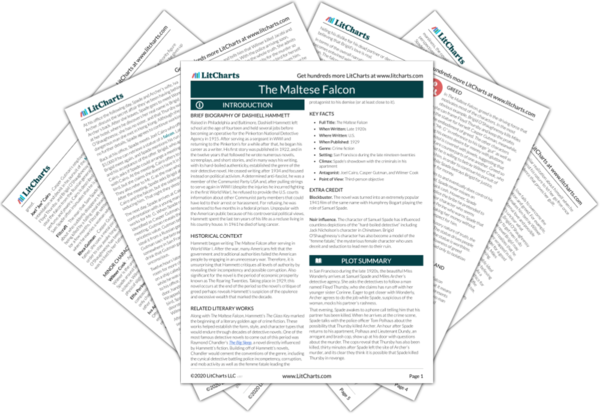Lies and Deceptions
The Maltese Falcon's plot develops through a series of deceptions. Most notably, Brigid O’Shaughnessy masks her involvement in the murders by appearing powerless and in love with Samuel Spade. Unlike Brigid, who hides her criminal behavior, the arch-villain Casper Gutman openly discusses his desire for the statue of the Maltese falcon. Although Gutman does not mask his law-breaking, he does hide behind his supposed respect for plain speaking in order to perform…
read analysis of Lies and DeceptionsAuthority, Justice, and a Code of Ethics
The Maltese Falcon explores the importance of a personal code of ethics in a world of incompetent authorities and an imperfect criminal justice system. Throughout the novel, Samuel Spade calls into question the police’s ability to apprehend the right criminals. Without any substantial evidence, Lieutenant Dundy changes from thinking that Spade killed Floyd Thursby to thinking that he killed Miles Archer. Spade even mocks District Attorney Bryan for concocting an unsupported mob-war motive for…
read analysis of Authority, Justice, and a Code of EthicsGreed
In The Maltese Falcon, greed is the driving force that motivates most of the characters. In the most obvious example, Brigid O’Shaughnessy kills Miles Archer so she can frame Floyd Thursby and keep the profits from selling the statue for herself. Casper Gutman, meanwhile, represents the embodiment of greed. The other characters refer to him as “Mr. G” in reference to his large “gut” as well as his greed, linking his excess desire…
read analysis of Greed
Masculinity, Femininity, and Sexuality
Most of the characters in The Maltese Falcon represent a different perspective on what it means to be a man or woman. For example, Samuel Spade represents the epitome of manliness. Multiple women desire him, no man is a challenge for him in a fight, and his tough exterior and unwavering sense of honor exemplify a certain type of masculinity. The novel idealizes his masculinity, essentially without criticism, even appearing to value his emotional detachment…
read analysis of Masculinity, Femininity, and SexualityFate and Death
While most characters don’t respond with much emotion to the deaths that occur around them, Samuel Spade’s story about Flitcraft reveals the importance of how people cope with mortality. Spade tells Brigid O’Shaughnessy about a former case of his in which a man named Flitcraft realizes how death can strike at any moment. After having this realization, Flitcraft leaves his family and wanders aimlessly around the United States before settling down with a new wife…
read analysis of Fate and DeathLove and Sex
In The Maltese Falcon, love fails to overcome the grim realities of deception and greed. For example, Casper Gutman’s greed makes him betray Wilmer Cook despite Gutman’s supposed paternal love and possible sexual attraction towards him. While it’s unclear what Gutman’s true feelings were for Wilmer, Brigid O’Shaughnessy uses sex and affection as a kind of currency to get men to do what she wants. Although by the end of the novel Brigid may…
read analysis of Love and Sex






